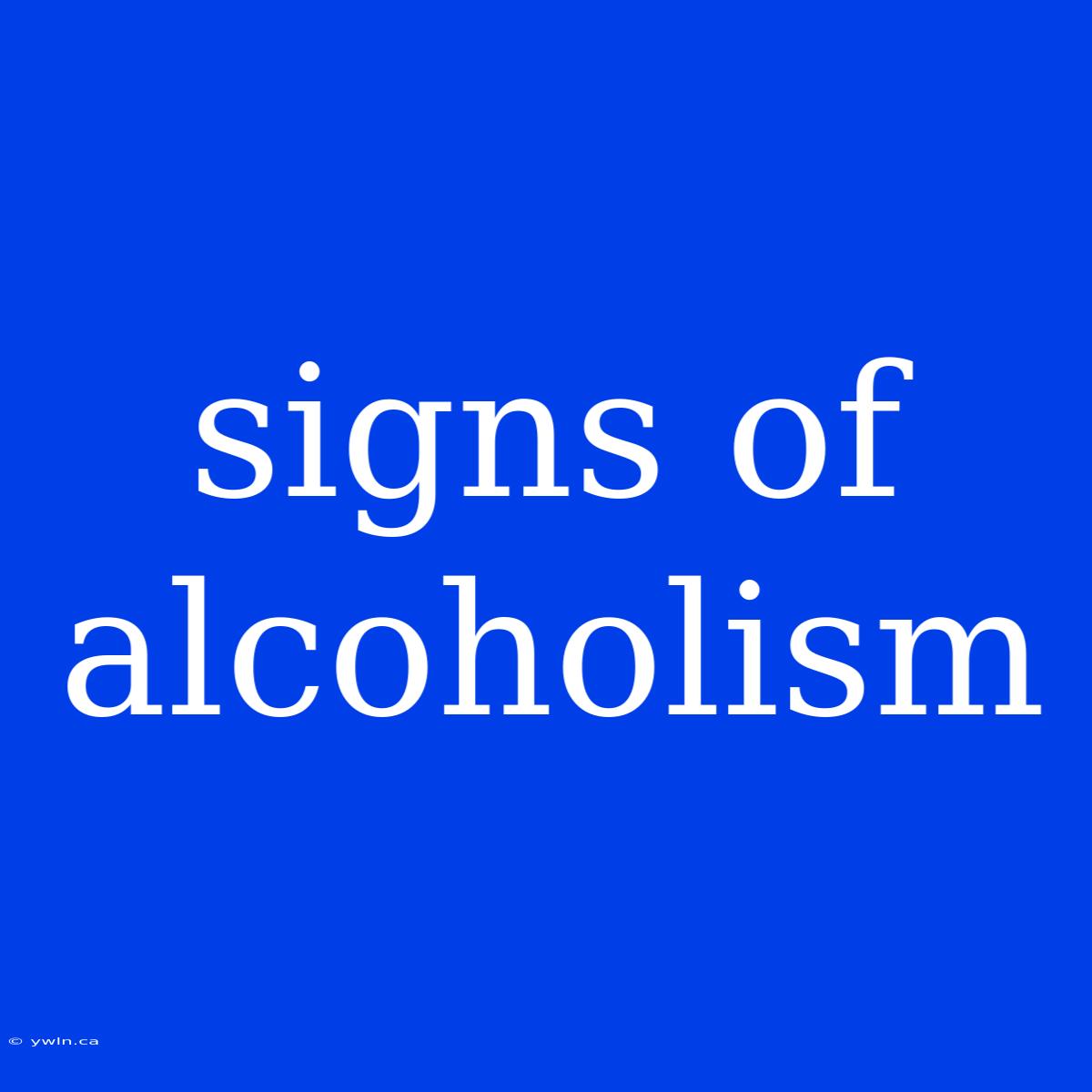Recognizing the Signs: Unmasking Alcoholism
Is alcoholism a growing concern in your life or the life of someone you care about? Alcoholism, a chronic and relapsing brain disease, can significantly impact a person's health, relationships, and overall well-being. Editor Note: This article explores the crucial signs of alcoholism, empowering you to recognize this condition and seek appropriate support. Understanding these indicators can be a crucial first step in seeking help for yourself or someone you love.
Analysis: Recognizing the signs of alcoholism can be challenging, as individuals often try to hide their drinking habits. Our research delves into the most common signs, drawing from scientific studies and expert opinions, to provide a comprehensive overview of this complex issue. This guide aims to equip readers with the knowledge needed to identify potential alcoholism and encourage seeking professional help.
Key Aspects of Alcoholism:
| Aspect | Description |
|---|---|
| Physical Signs | Changes in appearance, health, and body functions. |
| Behavioral Signs | Alterations in behavior patterns, including social interactions. |
| Psychological Signs | Changes in mood, thoughts, and emotions. |
| Social Impact | Alcoholism's effect on relationships, work, and social life. |
Alcoholism: A Closer Look
Physical Signs:
These signs can manifest due to the body's reaction to excessive alcohol consumption:
- Frequent hangovers: Characterized by headaches, nausea, fatigue, and dehydration, these can be a sign of regular heavy drinking.
- Changes in appearance: Weight fluctuations, skin issues, and a decline in overall appearance can be indicators.
- Sleep disturbances: Insomnia, restless sleep, or excessive sleepiness may be connected to alcohol use.
- Tremors: Shakiness in the hands or other body parts, particularly noticeable in the morning.
- Redness of the face: Alcohol consumption can cause dilation of blood vessels, leading to facial flushing.
- Gastrointestinal problems: Chronic alcohol abuse can lead to gastritis, ulcers, and liver damage.
Behavioral Signs:
Behavioral changes might indicate a shift in priorities:
- Increased tolerance: Needing more alcohol to achieve the desired effect.
- Withdrawal symptoms: Experiencing tremors, anxiety, or nausea when not drinking.
- Blackouts: Losing memory of events during periods of drinking.
- Making excuses for drinking: Minimizing or justifying excessive alcohol consumption.
- Prioritizing drinking over responsibilities: Neglecting work, family, or other obligations.
- Secretive drinking: Hiding alcohol consumption or drinking alone.
Psychological Signs:
Alcoholism can significantly affect emotional well-being:
- Mood swings: Experiencing rapid shifts in emotions, from elation to depression.
- Anxiety and depression: Alcohol abuse can lead to heightened anxiety or worsen pre-existing depression.
- Cognitive impairment: Memory problems, difficulty concentrating, and poor judgment.
- Increased irritability and aggression: Showing heightened anger, hostility, or impatience.
Social Impact:
Alcoholism can disrupt relationships and impact social functioning:
- Strained relationships: Alcohol consumption can lead to conflict and distance in relationships.
- Social isolation: Withdrawing from social events and activities due to alcohol use.
- Job problems: Alcoholism can affect work performance, attendance, and career opportunities.
- Legal problems: Driving under the influence, public intoxication, or other alcohol-related offenses.
Recognizing Alcoholism: Key Insights
- Severity: These signs may not always indicate alcoholism. The severity and frequency of these indicators can help determine the extent of the problem.
- Individuality: The signs of alcoholism can manifest differently in each individual, making it crucial to consider the entire context.
- Professional Assessment: A comprehensive evaluation by a healthcare professional is essential for accurate diagnosis.
The Importance of Seeking Help
If you suspect that you or someone you know is struggling with alcoholism, it is crucial to seek professional help. Treatment options such as therapy, support groups, and medication can be highly effective in managing this condition. Remember, early intervention is key for successful recovery.
Frequently Asked Questions (FAQ)
Q: Can someone be an alcoholic without exhibiting all these signs? A: Yes, alcoholism can manifest in different ways. Not everyone experiences all the signs mentioned above.
Q: Is alcoholism a choice? A: Alcoholism is a complex condition influenced by genetic predisposition, environmental factors, and personal choices. It is not simply a matter of willpower.
Q: What should I do if I suspect someone is an alcoholic? A: Approach the situation with compassion and understanding. Encourage them to seek professional help.
Q: Can alcoholism be cured? **A: ** Alcoholism is a chronic condition, but it can be managed effectively through treatment and ongoing support.
Q: Where can I find resources for help? A: There are many resources available, including:
- National Institute on Alcohol Abuse and Alcoholism (NIAAA):
- Alcoholics Anonymous (AA):
- Substance Abuse and Mental Health Services Administration (SAMHSA):
Tips for Helping a Loved One
- Express your concern: Use a calm and supportive approach when talking to them about your concerns.
- Encourage professional help: Emphasize the importance of seeking professional evaluation and treatment.
- Offer support: Provide emotional support, practical assistance, and a listening ear.
- Set boundaries: Establish healthy boundaries to protect yourself and avoid enabling their drinking.
- Be patient: Recovery is a process that takes time and requires patience and understanding.
Summary of Alcoholism Signs
This article explored the complex nature of alcoholism, highlighting the crucial signs that can help identify the condition. From physical and behavioral changes to psychological and social impacts, understanding these indicators is crucial in seeking help for yourself or a loved one. Remember, early intervention is key for successful recovery.
Closing Message:
Alcoholism is a serious condition, but it is not a hopeless one. With the right support and treatment, individuals can achieve sobriety and rebuild their lives. If you suspect alcoholism, encourage seeking professional help. By recognizing the signs and taking proactive steps, we can empower individuals to break free from the grip of this disease.

